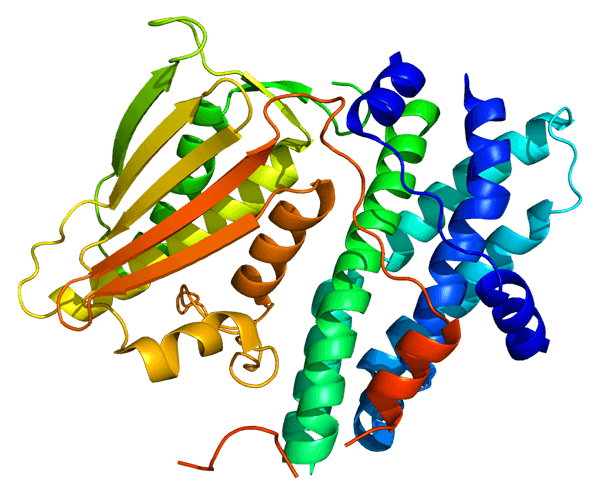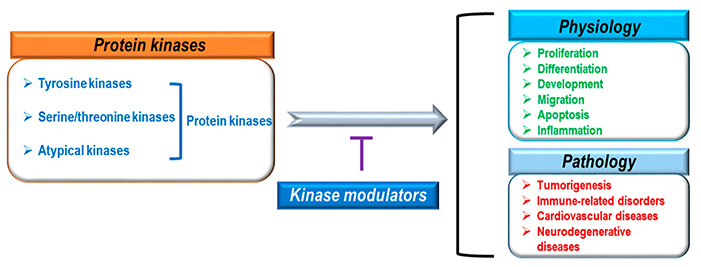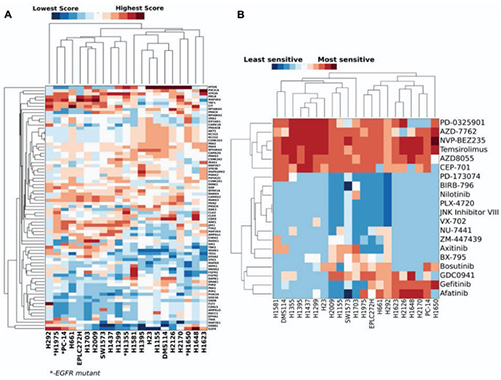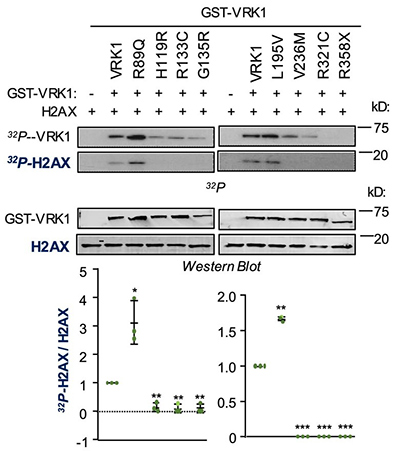Protein Kinase Assay
Creative BioMart offers one of the most comprehensive portfolios of Protein Kinase Assay Services in the industry, providing cutting-edge technologies to analyze kinase activity, screen inhibitors, and profile signaling pathways. With more than 500 kinase proteins and 800 assay types across eight distinct technology platforms, we deliver unparalleled flexibility for academic, pharmaceutical, and biotechnology research. Our extensive experience—spanning over 18,000 kinase profiling projects—ensures accurate, reproducible results tailored to your needs. From biochemical assays to pathway-level analysis, we empower researchers with robust solutions and free consultations to design strategies that accelerate drug discovery and mechanistic studies.

Protein Kinase Assays: Background and Significance
Protein kinases are pivotal regulators of cellular signaling, controlling processes such as cell growth, differentiation, and apoptosis. Their dysregulation is associated with numerous diseases, including cancer, diabetes, and neurodegenerative disorders, making them critical targets for therapeutic development. Accurate assessment of kinase activity is essential for both fundamental research and drug discovery. Traditional methods often lack throughput, sensitivity, or versatility. At Creative BioMart, we integrate advanced assay platforms, proprietary technologies, and extensive expertise to overcome these limitations, providing researchers with reliable and high-quality kinase assay solutions.

Figure 1. Physiological and pathological roles of protein kinases. (Adapted from Lee et al., 2017)
Protein Kinase Assay Services
Our protein kinase assay services encompass a broad range of applications:
-

Biochemical Kinase Assays
Direct activity measurements using peptide substrates and phosphate detection.
-

Kinase Antibodies & Immunoassays
Highly specific antibody-based detection methods for kinase activity and phosphorylation states.
-

Screening & Profiling Services
Comprehensive kinase inhibitor screening and profiling against hundreds of kinases.
-

Cellular Kinase & Phosphatase Pathway Assays
Functional assays to study kinase activity in cellular contexts.
-

Phosphate Metabolism Assays
Fluorogenic and chromogenic assays for phosphate ester metabolism and phosphatase activity.
-

Custom Assay Development
Tailored assay design and optimization to meet project-specific requirements.
Service Workflow

Key Features
|
Features |
Details |
|---|---|
|
Kinase Portfolio |
Over 500 kinase proteins available. |
|
Assay Diversity |
More than 800 assays across eight validated platforms. |
|
Project Track Record |
Over 18,000 kinase profiling projects successfully completed. |
|
Assay Technologies |
Homogeneous peptide-based assays, antibody-specific assays, and cell-based assays. |
|
Detection Methods |
Fluorogenic, chromogenic, and advanced enzymatic detection systems. |
|
Customization |
Flexible service models to support exploratory studies, large-scale screens, or targeted mechanistic investigations. |
Why Choose Our Kinase Testing Services
- Unparalleled Breadth: Largest portfolio of kinase proteins and assays in the industry.
- Proven Expertise: Decades of experience and collaborations with leading academic labs in phosphorylation research.
- High-Quality Data: Robust reproducibility backed by stringent quality controls.
- Advanced Technologies: Eight distinct assay platforms offering maximum flexibility.
- Comprehensive Support: Free expert consultations and end-to-end project assistance.
- Proven Track Record: Over 18,000 kinase profiling projects completed with global clients.
Case Studies and Applications
Case 1: Identifying kinase dependency with KAR
Ryall et al., 2015. doi:10.1093/bioinformatics/btv427
Targeted kinase inhibitors have transformed cancer therapy, yet predicting kinase dependency in patients or cell lines remains difficult since it does not always align with gene expression or mutation profiles. To address this, researchers developed the Kinase Addiction Ranker (KAR), an algorithm that integrates high-throughput drug screening data, kinase inhibition profiles, and gene expression patterns to pinpoint kinase dependencies. Applied to 21 lung cancer cell lines and 151 leukemia samples, KAR accurately predicted key dependencies. Experimental validation in lung cancer cell line H1581 confirmed FGFR and MTOR reliance, demonstrating synergistic growth inhibition with ponatinib and AZD8055 combination therapy.

Figure 2. KAR identifies relationships in kinase dependence among lung cancer cell lines. (A) Hierarchical clustering of scaled KAR scores for 21 lung cancer cell lines, showing relationships among cell lines and kinases. (B) Hierarchical clustering of drug IC50 data for the 20 overlapping drugs in each cell line’s dataset. (Ryall et al., 2015)
Case 2: Kinase assays reveal VRK1 variant defects in neuromotor syndromes
Martín-Doncel et al., 2019. doi:10.1038/s41598-019-49821-7
Rare polymorphisms in the VRK1 gene are linked to severe neuromotor disorders such as SMA, PCH, ALS, and microcephaly, yet their pathogenic mechanisms remain unclear. To investigate, researchers applied kinase activity assays and molecular modeling to study VRK1 variants found in affected patients. Results identified two major groups: variants with reduced protein stability (e.g., R133C, R358X, L195V) and those with diminished kinase activity across multiple substrates, including histones H3/H2AX, p53, c-Jun, coilin, and DNA repair protein 53BP1. The findings demonstrate that VRK1-related syndromes stem from a functional insufficiency in kinase activity or stability, disrupting critical cellular processes.

Figure 3. Phosphorylation of histone H2AX by different VRK1 pathogenic variant proteins performed by in vitro radioactive kinase assay. The graph shows the ratio of phosphorylated and non-phosphorylated substrates for each protein. (Martín-Doncel et al., 2019)
Client Success Stories with Our Kinase Assay Services
"Creative BioMart’s kinase profiling services were instrumental in advancing our oncology program. We needed to screen over 1,500 compounds against a panel of tyrosine kinases. Their high-throughput biochemical assays not only identified several novel inhibitors but also delivered highly reproducible IC50 data. The quick turnaround and detailed analysis gave our team the confidence to move promising candidates into preclinical development."
— Director of Oncology Research | Global Pharmaceutical Company
"As a mid-sized biotech focused on rare diseases, we had a unique kinase target with little existing assay support. Creative BioMart’s team developed a fully customized immunoassay using phospho-specific antibodies and validated it rigorously. The assay proved reliable in both biochemical and cellular settings, allowing us to characterize target engagement for the first time. Their flexibility and technical depth saved us months of in-house development."
— Head of Discovery Biology | Biotechnology Start-up
"We collaborated with Creative BioMart to investigate kinase signaling pathways involved in neurodegenerative disorders. Their cellular kinase and phosphatase pathway assays revealed key dysregulated nodes in MAPK and PI3K/AKT signaling. The data not only supported our mechanistic hypotheses but also contributed to a high-impact journal publication. Their team’s responsiveness and scientific input made them an invaluable partner in our research."
— Principal Investigator | Academic Research Institute
"Resistance mutations in kinases are a major challenge in our drug discovery pipeline. Creative BioMart helped us profile multiple resistant kinase variants using their broad assay platforms. The detailed kinetic and inhibition data they provided guided our medicinal chemists in designing next-generation inhibitors with improved potency. Their expertise in kinase biology and large assay portfolio gave us a clear competitive advantage."
— Senior Scientist, Medicinal Chemistry | Biopharmaceutical Company
FAQs About Protein Kinase Assays
-
Q: What types of kinase assays do you offer?
A: We provide one of the most comprehensive assay portfolios in the industry, including biochemical kinase assays, immunoassays, cellular kinase and phosphatase pathway assays, and kinase screening & profiling services. With over 800 assays across eight distinct technology platforms, we can support projects ranging from basic research to advanced drug discovery. -
Q: How many kinase proteins are available for testing?
A: Creative BioMart offers access to over 500 kinase proteins, covering a wide variety of kinase families. This breadth allows for flexible and targeted profiling across tyrosine kinases, serine/threonine kinases, and lipid kinases, among others. -
Q: Can you help with custom assay development?
A: Yes. If your kinase target or pathway of interest is not covered by our existing panels, our team can develop and validate custom assays. We frequently support clients with rare or novel kinase targets, ensuring robust and reproducible data. -
Q: What experience does your team have with kinase assays?
A: We have completed over 18,000 kinase profiling projects, partnering with pharmaceutical companies, biotech startups, and academic institutions worldwide. Our decades of technical experience, combined with collaborations with leading labs in phosphorylation research, ensure top-quality results. -
Q: Do you provide guidance on assay selection?
A: Absolutely. We offer free consultations to help you choose the most appropriate tools, technologies, or service options based on your project’s objectives. Our experts can recommend the right platforms for high-throughput screening, detailed mechanistic studies, or pathway analysis. -
Q: What makes your kinase assay services stand out from others?
A: Our service combines breadth, flexibility, and scientific expertise. With access to one of the largest kinase panels, multiple validated assay formats, custom development options, and a proven track record of delivering reliable results, we provide both efficiency and depth that accelerate research and drug discovery.
Resources
Related Services
- Enzyme Activity Assay
- High-Throughput Screening
- Enzyme Target and Screening
- Protein Pathway Profiling
- Metabolism Assays
Related Products
References:
- Lee C, Baek J, Han SY. The role of kinase modulators in cellular senescence for use in cancer treatment. Molecules. 2017;22(9):1411. doi:10.3390/molecules22091411
- Martín-Doncel E, Rojas AM, Cantarero L, Lazo PA. VRK1 functional insufficiency due to alterations in protein stability or kinase activity of human VRK1 pathogenic variants implicated in neuromotor syndromes. Sci Rep. 2019;9(1):13381. doi:10.1038/s41598-019-49821-7
- Ryall KA, Shin J, Yoo M, et al. Identifying kinase dependency in cancer cells by integrating high-throughput drug screening and kinase inhibition data. Bioinformatics. 2015;31(23):3799-3806. doi:10.1093/bioinformatics/btv427
Contact us or send an email at for project quotations and more detailed information.
Quick Links
-

Papers’ PMID to Obtain Coupon
Submit Now -

Refer Friends & New Lab Start-up Promotions

